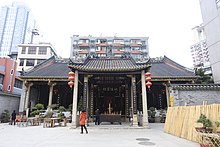City god (China)
| City God | |||||||||||||||

Temple of the City God of Guangzhou
|
|||||||||||||||
| Chinese | 城隍神 | ||||||||||||||
|---|---|---|---|---|---|---|---|---|---|---|---|---|---|---|---|
|
|||||||||||||||
| Transcriptions | |
|---|---|
| Standard Mandarin | |
| Hanyu Pinyin | Chénghuángshén |
| Yue: Cantonese | |
| Yale Romanization | Shingwongsan |
| Southern Min | |
| Hokkien POJ | Sêng-hông-sîn |
The Chenghuangshen (Chinese: 城隍神; pinyin: Chénghuángshén), literally god of the moat and the walls or god of the boundary, but usually translated as City God, is a tutelary deity or deities in Chinese folk religion who is believed to protect the people and the affairs of the particular village, town or city of great dimension, and the corresponding afterlife location.
Beginning over 2000 years ago, the cult of the Chenghuangshen originally involved worship of a protective deity of a town's walls and moats. Later, the term came to be applied to deified leaders from the town, who serve in authority over the souls of the deceased from that town, and intervene in the affairs of the living, in conjunction with other officials of the hierarchy of divine beings.
In the name Chénghuángshén (城隍神), the first character cheng (城) means "city wall" (a "defensive rampart"; or, by extension, "walled city") and the second character, huang (隍), literally means "moat". Shen (神) means a god. Put together, Chenghuangshen was originally the name of a deity or type of deity believed to be able to provide divine protection to a city's physical defenses, particularly its surrounding wall and moat. Later the concept became more generalized, and the meaning extended to the office itself of such a deity, rather than the presumed office-holder (in later times, it was standard to officially appoint the spirit of the government official in charge of the city to a three-year term as City God, upon his decease).
There are temples dedicated to the local Chenghuangshen in many cities of China. Much as the ancient Greeks, the Chinese traditionally believed that guardian gods watched over cities. Chenghuangshen are believed to be involved in communal concerns such as the need for rain, and may be involved in personal requests such as recovery from illness. Town residents may appeal to the City God for help in a natural disaster or other crisis. The City God may also be called upon to help those who are accused of crimes. The accused appear before the god and ask for a sign to help prove their innocence.
Usually, these patron gods are deified deceased officials. Chenghuangshen are believed to hold an important position in the imperial times it was often debated whether local gods such as the City God held more power than the local officials. There could also be a relation between the City God and the official. The official or magistrate would often turn to the Chenghuangshen for advice and help in governing the city.
...
Wikipedia
